|
|
|
|
This monthly newsletter highlights the latest insights, resources, and evidence-based best practices.
Our hope is that this newsletter makes it easy for you to stay on top of trends and allows you to provide the best possible care for those you work with and serve.
|
|
|

CDC, CMS and Others Call for Urgent Action on Patient Safety
A group of federal and industry safety leaders issued an urgent call for health care organizations to rebuild the foundations for safe care that deteriorated during the pandemic. The National Steering Committee for Patient Safety—a group of leaders from 27 organizations, including the Centers for Disease Control and Prevention (CDC), Centers for Medicare & Medicaid Services (CMS) and the Agency for Healthcare Research and Quality (AHRQ)—issued the call to action. The expert committee, created by the Institute for Healthcare Improvement, shared its Declaration to Advance Patient Safety this week during the institute's Patient Safety Congress in Dallas. The committee is urging healthcare leaders to:
- Review the 17 recommendations and strategies to improve patient safety detailed in its national action plan.
- Appoint a leader and team to evaluate their organization's current state of safety using a self-assessment tool.
- Implement strategies to strengthen their organization's safety performance and develop methods to track progress by using an implementation resource guide.
"There is a critical need for healthcare leaders to take urgent action to create, rebuild and sustain the foundations for safe care to address long-standing challenges and troubling setbacks in patient and workforce safety during the pandemic," Patricia McGaffigan, RN, vice president of the institute, said in a May 17 news release. "The national action plan provides leaders with the tools to assess the current state of their organization’s foundational safety practices and offers actionable solutions for a clear path forward."
|
Alliant HQIC Quality Leader Summit
Tuesday, June 14, 2022, at 1 p.m. ET (60 min.)
The Alliant Hospital Quality Improvement Contractor (HQIC) team will discuss updates based on the 30-month goals and accomplishments for our 150 enrolled hospitals. The Alliant HQIC team and partners will discuss the new patient safety cohorts, as well as revised coaching packages and educational opportunities, including webinars and bite-size learning videos.
In addition, learn from St. Mary’s Good Samaritan, a critical access hospital in Greensboro, GA. and how their Community Health Needs Assessment (CHNA) identified and prioritized health needs and improved outcomes for medically underserved communities. Intermountain Health Care will also present on how they focus on Social Determinant of Health (SDOH) to address improvement in community health.
Register Here
Save the Date for Alliant's Twitter Chat
Alliant Health Solutions is hosting our first live Twitter chat on Tuesday, June 28, from 11 a.m. to 3 p.m. ET. The topic will focus on decreasing hospital and facility readmissions. A new question will be tweeted at the top of each hour. Participate and follow the chat using #ChatWithAlliant.
Upcoming Learning and Action Network (LAN) Events
Moving Forward Using Lessons Learned to Prevent Central Line-Associated Bloodstream Infections (CLABSI)
Thursday, June 23, 2022, at 1 p.m. ET (60 min.)
This dynamic webinar will feature proactive strategies and tools for preventing all-cause harm related to CLABSI. Also, learn about a hospital’s success with engaging leaders, providers and front-line staff in a hospital-wide initiative to drive down device utilization, increase bundle compliance and improve outcomes.
Register Here
Past Learning and Action Network (LAN) Events
Infection Prevention: Words of WISDOM (What I Should Do on Monday)
Recorded on May 24
In this presentation, infection preventionists provided insights from years of experience in health care. This collective group offered their words of wisdom that can be put into action to assist your hospital’s infection prevention and performance improvement of patient care.
Watch Recording | View Slides
Patient Safety Cohorts
Alliant HQIC identified a cohort of hospitals for specific patient safety topics and is in the process of conducting kick-off calls. Subject matter experts and quality improvement coaches will work 1:1 with hospitals over the next six months to analyze data and drive performance improvement. HQIC Cohorts
View All Upcoming Events Here
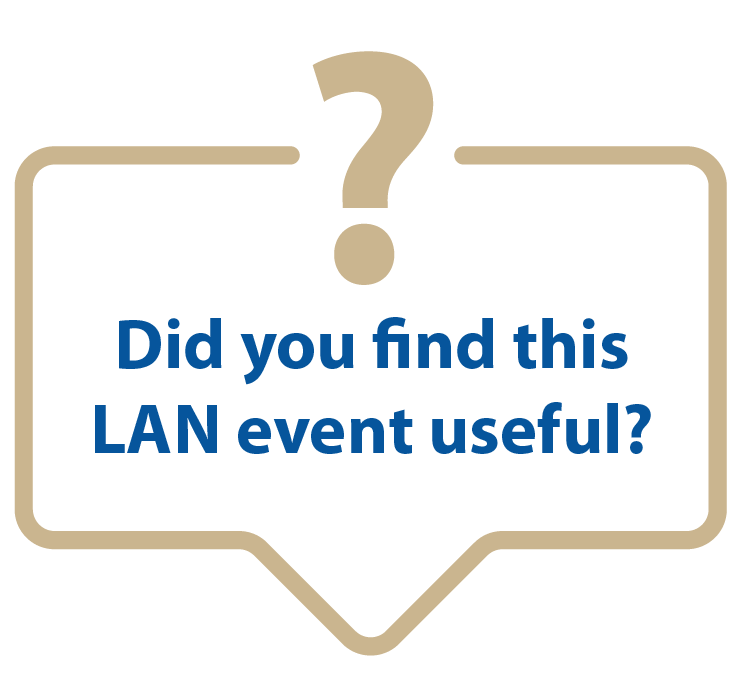
If Yes, Click Below.
Click here if you attended the April LAN event and were able to "use tomorrow" what you heard during the webinar.
View All Previous LAN Event Recordings
Community of Practice (CoP) Calls
CMS hosts CoP calls on the second Thursday of each month at 1 p.m. ET | 12 p.m. CT | 11 a.m. MT | 10 am. PT. The calls are open to all Alliant HQIC hospitals.
The Impact of Health Care-Associated Renal Damage, and the Connection to Long-Term Renal Disease: How Can Health Care Organizations Reduce Risk for Patients?
Thursday, June 9
Join Health Services Advisory Group and the HQIC community as we summarize the impact of COVID-19 on CLABSI, discuss lessons learned, and review the importance of CLABSI best practices with facility-specific examples of how to control device utilization, bundle compliance and associated infections.
Register Here
COVID Office Hours-IP Chat
Alliant is aware that infection preventionists (IPs) are under pressure to ensure the organizations they serve are aware and responding to ever-changing requirements. In our rural and critical access hospitals, many IPs have limited time to stay up-to-date on the information needed to implement effective control measures and sort through new information as science evolves. In these chats, IPs discuss their challenges and solutions. For more information, visit the Alliant website. preventionists (IPs) are under pressure to ensure the organizations they serve are aware and responding to ever-changing requirements. In our rural and critical access hospitals, many IPs have limited time to stay up-to-date on the information needed to implement effective control measures and sort through new information as science evolves. In these chats, IPs discuss their challenges and solutions. For more information, visit the Alliant website.
Stay tuned for a redesign that includes:
- Host: Amy Ward
- New Title: IP Office Hours
- Frequency: 4th Wednesday of every month beginning June 22
- Time: 2-2:30 p.m. ET
- Registration: Yes
June 22 at 2 p.m. ET - Register Here
July 27 at 2 p.m. ET - Register Here
Questions? Contact Amy Ward at amy.ward@allianthealth.org.
NHSN Bite-Sized Learning Videos
Alliant HQIC developed a series of bite-sized learnings to assist hospital infection preventionists with some of the most frequently asked questions regarding the National Healthcare Safety Network (NHSN) database. Topics covered include annual surveys, monthly reporting plans, adding new users or changing the facility administrator, facility mapping, data entry, and analysis. Watch the Videos
|
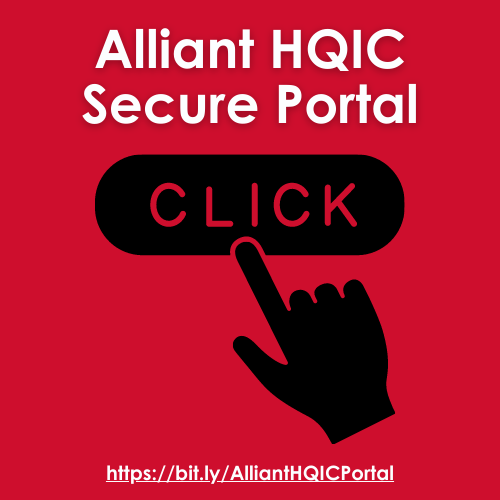 Alliant HQIC Online Portal Alliant HQIC Online Portal
Access the Alliant HQIC portal to view your assessments and measurement data, and chat with other HQIC-enrolled hospitals to share best practices, barriers and solutions. Download Portal Instructions to Get Started
Coaching Packages
Check out the best practice interventions with associated resources for adverse drug events, hospital-associated infections, antibiotic stewardship, pressure injures, sepsis, readmissions, health equity and patient and family engagement. Available on the Alliant website
Check In: How Are We Doing?
Alliant HQIC wants to hear from you! Please click here to share feedback with us.
Behavioral Health/Opioid Stewardship
Statistics for Five Leading Substance Use Disorders
The Agency for Healthcare Research and Quality provided the rate of inpatient stays and geographic variation for alcohol-related, opioid-related, stimulant-related, sedative-related, and cannabis-related disorders from 2016-2018. View the Statistics
Patient Safety
Safety Awareness
Universal Skills for Safety: Add STAR to Your Toolkit
STAR is a brief self-check to avoid errors. When should we do this? Any condition that would increase the potential for an unintended error while performing a familiar task, such as time pressure, doing multiple things at once, interruptions, distractions or stress. Take a quick inventory. Do you have the equipment, tools and supplies necessary for the job? Are they working? Are there any risks?
In just a few seconds, STAR can help ensure you are ready to proceed.
- Stop: Pause 1-2 seconds to focus on what you are going to do. Be mindful (it gives the brain chance to catch up with what your hands are getting ready to do)
- Think: Is this the right thing to do?
- Act: Concentrate and perform the task
- Review: Check for the desired result
STAR takes only seconds and reduces the probability of making an error by a factor of 10 or more. Learn More
Adverse Drug Events
Effects of Tall Man Lettering on the Visual Behavior of Critical Care Nurses While Identifying Syringe Drug Labels
Tall man lettering (TML) is a promising approach to distinguishing look-alike, sound-alike drugs to avoid medication errors. Although several institutions recommend TML, the evidence on the use of TML and its influence on visual attention is limited. In a simulated setting, the use of TML reduced the error rate of critical care nurses while identifying drug names on syringe labels. Eye-tracking data revealed that TML in syringe labels changed visual attention compared to labels without TML. Eye-tracking allowed the investigation of subtle differences in visual behavior relating to the position of TML in drug names, which might help improve drug label designs and reduce medication errors in intensive care units. Read More
Antibiotic Stewardship
Antibiotic Stewardship Strategies and Their Association with Antibiotic Overuse after Hospital Discharge: An Analysis of the Reducing Overuse of Antibiotics at Discharge (Road) Home Framework
Hospitals that reviewed patients’ use of antibiotics before discharge had less antibiotic overuse, AHRQ-supported research found. In a survey of 39 Michigan hospitals conducted in 2019, researchers found that hospitals used a median of 12 antibiotic stewardship strategies, including establishing an antibiotic stewardship team and reviewing antibiotics before discharge. The more stewardship strategies a hospital used, the lower its antibiotic overuse at discharge. However, a review of antibiotics before discharge was the only strategy consistently associated with lower antibiotic overuse. The study, published in Clinical Infectious Diseases, reported that strategies targeted specifically at the discharge process showed the most success in reducing antibiotic overuse. Read the Study
Health Care-Associated Infection
APIC Toolkit: Tips for Isolated Infection Preventionist
New IPs often report feeling isolated or overwhelmed when starting in the profession. Members of the APIC Professional Development Committee developed a toolkit as a resource to provide practical guidance and support to IPs who are working in rural or isolated settings or who are new to their role. Download the Toolkit
CLABSI Update to SHEA Compendium
Updates to the previously published guidelines provide recommendations for CLABSI prevention in acute care hospitals. This expert guidance is sponsored by the Society for Healthcare Epidemiology, Infectious Diseases Society of America, the Association for Professionals in Infection Control and Epidemiology, the American Hospital Association and The Joint Commission. Originally published in 2014, the updates consider new evidence including recommendations that have been added, removed or altered. Read More
Pressure Injuries
A Brighter Future for Pressure Injury Prevention: A Look at Emory Hillandale’s Performance Improvement Process
Check out the April 26, 2022, LAN event, Walk with the WOC and Step into a Brighter Future of Pressure Injury Prevention, for a presentation on Emory Hillandale’s performance improvement process, including decision trees and a change path for key takeaways and intervention strategies.
Patient and Family Engagement
Person and Family Engagement Metric Digest
Person and family engagement (PFE) helps hospitals address what matters most to patients and families and improves hospitals’ ability to achieve long-term improvements in quality and safety. The five PFE metrics ensure that hospitals have, at a minimum, structures and practices that enable active patient and family partnership at three levels of the hospital setting: point of care, policy and protocol, and governance.
Metric 1: Planning checklist provided to patients during pre-admission and hospital stay to ensure they are knowledgeable about their stay and the care that will be provided (e.g., elective surgery, scheduled admissions).
- Inform clinicians and staff about the use and purpose of the pre-admission planning checklist, including why it is important and how it can help engage patients and families.
- Delineate key roles and responsibilities to ensure accountability for reviewing and discussing the checklist with patients and family members.
- Most hospitals also post the planning checklist on their website for patients to access before hospital admission.
Read More
Patient Experience at Acute Care Hospitals Worsened During Pandemic
According to The Leapfrog Group, the COVID-19 pandemic highlighted the need for increased investment in patient safety and experience. The Adult Inpatient Care report, the second part of The Leapfrog Group's three-part series, Patient Experience During the Pandemic, provides insight into how the patient experience was impacted throughout the pandemic. Read the Article
Health Equity
American Hospital Association Launches Health Equity Roadmap
The Health Equity Roadmap, which builds on the goals established by the National Call to Action to Eliminate Health Care Disparities and AHA’s #123forEquity Pledge, is designed to meet hospitals and health systems where they are on their equity journey. It includes customized resources and action plans, among other support tools, to guide organizations throughout the transformation process. To learn more, visit AHA’s Health Equity Roadmap webpage and watch the short video.
Announcing the CMS Framework for Health Equity
The CMS Office of Minority Health has released the CMS Framework for Health Equity. This Framework challenges us to incorporate health equity and efforts to address health disparities as a foundational element across all our work—in every program and across every community. Read the CMS Framework for Health Equity
Readmissions/Care Transitions
Assessing Patients’ Risks for Readmissions
The Hospital Readmissions Reduction Program (HRRP) encourages hospitals to improve care coordination and, in turn, reduce avoidable readmissions to avoid a penalty if its readmission rate is higher than expected given the national trend. HRRP includes 30-day unplanned readmissions for six measures:
- Acute myocardial infarction
- Chronic obstructive pulmonary disease
- Heart failure
- Pneumonia
- Coronary artery bypass graft surgery
- Elective primary total hip arthroplasty and/or total knee arthroplasty
Based on coaching calls with hospitals working to reduce 30-day readmissions, the top interventions are:
- Risk assessment conducted properly upon admission
- Assess social determinants of health upon admission
Download the PRAPARE (Protocol for Responding to and Assessing Patients’ Assets, Risks and Experiences) Screening Tool
Let us know what risk assessment your hospital is using to reduce readmissions. Email Karen Holtz at Karen.holtz@allianthealth.org
|
COVID-19 Care
The Cost of Caring Report
For over two years, hospitals across the country have provided front-line care, compassion for families and protection for our communities. On April 25, 2022, the American Hospital Association (AHA) released a report highlighting the surging costs for labor, drugs, medical equipment and supplies, and other resources because of the COVID-19 pandemic. The report looks at each issue separately. View the Report.
NCRN COVID-19 Resources
Alliant Health Solutions is a strategic partner in the Morehouse School of Medicine National COVID-19 Resiliency Network (NCRN) in mitigating the effects of COVID-19. Check out two of our new resources below:
|
Hospital Heroes
Archbold's Grady General Hospital Receives Top Safety Score
In a recent nationwide report known as the Hospital Safety Score, The Leapfrog Group awarded Archbold's Grady General Hospital in Cairo, Ga., a grade of 'A' for the hospital's performance based on patient outcomes.
The Leapfrog Group, an independent nonprofit organization, uses a grading system of A, B, C, D and F to rate hospitals based on over 30 national performance measures reflecting errors, injuries, accidents and infections.
"Patients who enter our doors know that our team of physicians and clinicians will provide high-quality and safe care," said Crystal Wells, administrator at Archbold's Grady General Hospital. "It's rewarding to see our staff's efforts recognized nationally, and I'm so proud of what our team has accomplished."
The Leapfrog Hospital Safety Grade is the only hospital rating program based exclusively on hospital prevention of medical errors. The grading system is peer-reviewed, fully transparent and accessible to the public. Read the Article
|
Success Stories
Georgia Hospital Maintains Zero Rate for Hospital-Acquired Pressure Injuries
Emory Hillandale, a 100-bedhospital
located on the eastern perimeter of Atlanta, is part of Emory Healthcare, Georgia's most comprehensive academic health system. The leadership team at Emory Hillandale empowered the Wound, Ostomy and Continence (WOC) nurse to own the process of reducing hospital-acquired pressure injuries. Fran Perren MSN, BSW, RN, NEA-BC, CWOCN, is the unit director of WOC Services at Emory Decatur/LTAC/Hillandale and led the hospital teams to maintain zero rates. Fran’s performance improvement process includes:
- Determine at-risk population
- Develop a skin prevention bundle for at-risk patients
- Provide simple decision trees for clinicians
- Form a bedside team to lead the way:
- Teach proper intervention
- Measure compliance of intervention
- Become a unit resource for skin management
- Discuss barriers to performance improvement
- Celebrate all wins
Along with ongoing leadership support and guidance, successful outcomes are also attributed to bedside teams. Teams receive train-the-trainer education, instruct at the quarterly Skin Competency Skills Fair, conduct monthly prevalence audits, and participate in performance improvement initiatives.
Photos are of bedside teams celebrating achievements. Both Emory Hillandale and Emory Decatur are maintaining zero rates.
Patient and family education is also vital to successful patient outcomes. Kathy McGowan, MPH, patient advocate and former vice president of quality and safety at the
Georgia Hospital Association, shared her son Michael’s story of how teach-back methodology led to a positive patient experience.
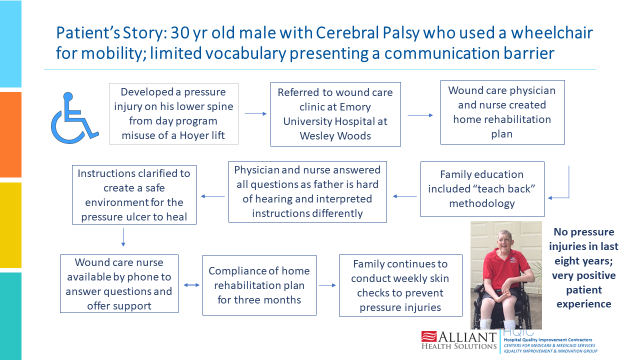
See Alliant’s website for the April 26 LAN presentation and recording and the Change Path for key takeaways and implementation strategies.
Alabama Hospital Reduces 30-Day Readmissions
Marshall Medical Centers provides comprehensive
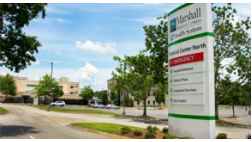 |
|
Marshall Medical North
Guntersville, Ala. |
|
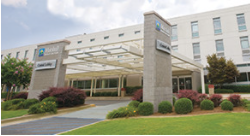 |
|
Marshall Medical South
Boaz, Ala. |
|
inpatient and outpatient health care services for the residents of Marshall County and the surrounding area (population of about 125,000) with two hospitals: North, a 90-bed hospital located in Guntersville, Ala. and South, a 150-bed hospital located in Boaz, Ala.
Named by the Joint Commission as a "Top Quality Performer" among America's hospitals, Marshall Medical Centers has implemented risk reduction strategies to decrease 30-day readmissions, focusing on THA/TKA and COPD patients.
To keep readmission rates low for THA/TKA patients, the team implemented the following:
- Joint Academy - This 45-minute class reviews everything the patients can expect going into surgery and how to take care of themselves once they go home.
- In-house education - Prior to discharge, all the patients are visited by one of our case managers to discuss self-care management once they go home and ensure the patients know the time and date of follow-up appointments.
- Follow-up calls - Made three to five days post-discharge and two weeks post-discharge to ensure patients are following all discharge instructions and discuss any issues.
All COPD patients receive a visit from an RN Case Manager prior to discharge and receive the following resources:
- Zone Magnets - Three color-coded magnets that indicate how patients are feeling that day and specific instructions to follow.
- Educational Literature - Brochures to help educate patients on their disease and how to take care of themselves.
As of December 2021, Marshall Medical Center South has successfully deceased preventable readmissions and has met the 1% reduction target goal. Current data show an average rate of 11.2%, a decrease of 1.6% over the 2019 baseline (12.8%). Congratulations and good work! View the Community of Practice presentation
|
|
|
Connect with us!
    Click here if you'd like to share your corporate profiles with us and we'll connect with you!
Click here if you'd like to share your corporate profiles with us and we'll connect with you!
|
| |
Hospital Quality Improvement Project Collaborators


|
| |
|
Copyright © 2022, All rights reserved.
Our mailing address is:
Alliant Health Solutions
1455 Lincoln Pkwy
Suite 800
Atlanta, GA 30346
|
For more information about Alliant Health Solutions, visit the website: www.allianthealth.org
For questions or information about free technical assistance, please contact:
Share this email with a friend or colleague:  
|
|
|
|
|